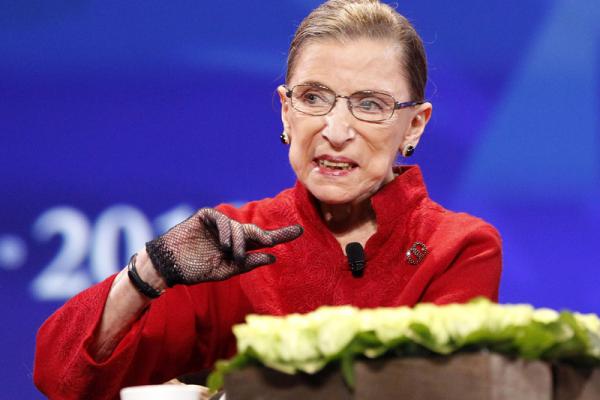Rabbi Ruth Bader Ginsburg?
Not quite, but when a Jewish nonprofit asked the Supreme Court justice to write a biblical commentary for Passover, she agreed, and added a feminist twist: It would raise up the often overlooked women of the Exodus story.
Ginsburg, one of three Jews and three women on the high court, is known as a champion of women’s rights — but not for being particularly religious.
But Rabbi Lauren Holtzblatt, whom Ginsburg asked to help out with the commentary, said Ginsburg had a clear vision for the piece and knew exactly which biblical women she wanted to highlight from the iconic liberation story of the Book of Exodus.
“She has a Jewish soul, there is no question,” Holtzblatt, a rabbi at Adas Israel, a Conservative synagogue in Washington, D.C., said of Ginsburg.
“It’s in her. It’s deeply in her.”
The New York-based American Jewish World Service, which aims to alleviate poverty in the developing world, invited Ginsburg to write about Passover for its “Celebration and Compassion” essay series, in which prominent leaders comment on Jewish teachings on the holidays to spark conversations about social justice.
Holtzblatt, tapped by Ginsburg in part because Ari Holtzblatt — the rabbi’s husband — is one of Ginsburg’s law clerks, said she is incorporating the commentary into her own seder, the ritual meal that celebrates Passover. The holiday this year begins the evening of April 3.
In most traditional retellings, the enslavement of the Israelites in Egypt and God’s parting of the Red Sea is a story that stars men. But Jewish women in recent years have sought to highlight the roles played by women in the liberation.
Ginsburg and Holtzblatt, for example, write about Yocheved, Moses’ mother, and Miriam, his sister. They also pay homage to Shifra and Puah, the midwives who rejected Pharoah’s decree to kill all the Jewish baby boys. And they recognize Batya, Pharoah’s daughter, who plucked baby Moses out of the Nile River.
Much is lost when only the heroes are celebrated, to the exclusion of the heroines, Holtzblatt said — and Ginsburg wanted to get that across.
The Book of Exodus, much like the Book of Genesis, begins in darkness, with the accession of a new Pharaoh who enslaves the Jews, their commentary reads.
“God alone lights the way out of the darkness in Genesis,” it continues.
“But in Exodus, God has many partners, first among them, five brave women.”
Lauren Markoe covered government and features as a daily newspaper reporter for 15 years before joining the Religion News Service staff as a national correspondent in 2011. Via RNS.
Got something to say about what you're reading? We value your feedback!
